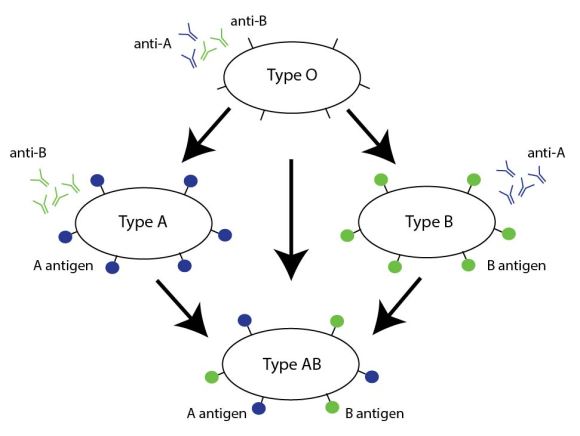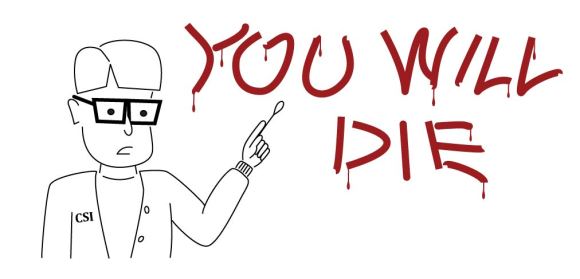What’s your blood type? In Japan you’re more likely to hear this question than “What’s your sign?” That’s because it’s a popular belief in Japan that your biology and genetics determine your temperament (which honestly makes more sense than the night sky dictating personality) [1]. My blood type is A+. That means I’m outwardly calm and patient, but I also have a tendency to be a perfectionist. I guess that’s not too far off. I do find it oddly satisfying that my blood type has the highest possible grade.
But if it’s true that blood type determines your personality, that means there’s only four types of people in the world, type A, B, O, and AB. People seem more complicated than that, but maybe I’ve missed something. Let’s take a closer look at the gene that determines blood type, this week’s gene of interest: ABO.
People have always held strange beliefs about blood. Physicians used to believe that balancing blood volumes controlled health. Bloodletting, or controlled bleeding, was a common treatment for almost any illness [2]. It was even used to treat stab wounds. In 1824, after a French general was stabbed through the chest, his physicians treated him with regular bloodletting for a month “to prevent inflammation”. He lived, but his “treatment” cost him 4.8 liters of blood, not including extra blood loss from the medicinal leeches (probably another liter) [3]. For reference, average blood volume is about 5 liters. His blood loss was spread over a month, but still, that guy had to replenish his entire blood supply – and survive a stab wound.

“Already healing nicely. Just in case, I’ll prescribe some medicinal leeches.”
Unlike leeches, blood transfusions were avoided because they generally resulted in death. It wasn’t until 1901 that we discovered why.
When Karl Landsteiner mixed his blood with that of his lab members, he noticed that while many of the samples would clump when mixed, some did not [4]. The clumps were caused by antibodies attacking blood cells. The body makes thousands of antibodies against foreign proteins called antigens. Generally antigens can be found on the outside of bacteria and viruses, but cells can have antigens too. The ABO gene makes a kind of antigen. Each blood type refers to the type of antigen that’s present on the outside of red blood cells. Type A has the A antigen; type B, the B antigen; type AB, both A and B antigens; and type O, neither.

Arrows indicate blood type compatibility. Type O can donate to all blood types, type A to itself and type AB, type B to itself and type AB.
The immune system makes antibodies for everything except the body’s own antigens. For someone like me with type A blood, the immune system makes antibodies against the B antigen, but not the A antigen. So, as long as I don’t receive a transfusion that contains the type B antigen (type B or type AB), I should be fine.
In reality, blood types are a little more complicated than the ABO system. The ‘+’ after my A+ means my body also makes the Rh factor, another antigen controlled by another gene: RHD. But it gets even more complicated. There are actually hundreds of different blood antigens [5]. With new antigens discovered every few years, it’s actually safer to repeat Landsteiner’s test before each transfusion than rely on a simple blood type system. Mix a sample of the patient’s blood with a possible donor’s. If it clumps, try the next one.
The ABO +/- system helps narrow down compatible donors, but in reality a true blood type would look more like this: O, r”r”, K:–1, Jk(b-). This means that blood type personality system might need a revision to account for the millions of possible blood types. Or maybe it’d be easier to just get to know people instead of sorting them into little boxes.

“Ironically, the killer wrote this in B+.”
References
[1] “Japan and blood types: Does it determine personality?”. BBC News. 5 November 2012.
[2] “Bloodletting”. British Science Museum. 2009.
[3] “Case of a Wound of the Right Carotid Artery”. Lancet 6 (73): 210–213.
[4] Dean L. (2005). Blood Groups and Red Cell Antigens. National Center for Biotechnology Information. Bookshelf ID NBK2267.
[5] “Your Blood Type is a Lot More Complicated Than You Think”. Smithsonian.com. 5 June 2014.
[…] was severe, they would also transfuse hemophiliacs with the blood of a relative – a potential disaster if their blood was incompatible [2]. Ultimately, hemophiliacs like Leopold were destined to live […]
LikeLike
[…] bloodstream, but it has to do so carefully. Not only can mother and child have a different blood types (so direct connection of blood vessels would be a huge no-no), to the mother’s immune system, the […]
LikeLike